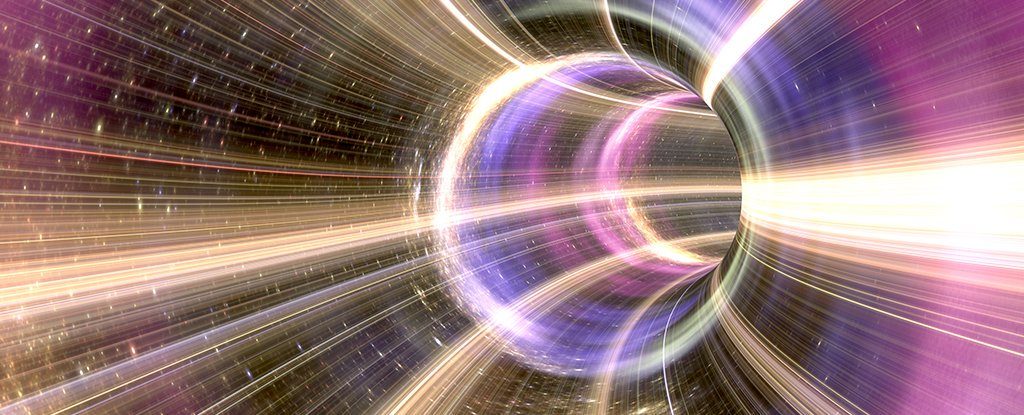
Here’s another one for the ‘black holes are weird’ file: a team of mathematicians has calculated that some black holes in an expanding Universe like ours can press the reset button on the history of their contents, effectively erasing the past and turning the future into a giant question mark.
Exactly what this would look like from an observer’s point of view is anybody’s guess. But if it turns out to be true, we might finally have a solution to one of the biggest questions in modern cosmology.
If we follow the laws of physics to their logical conclusions, all the mass of a collapsed star gets squeezed into an infinitely small point called a singularity.
That’s a little like saying there are volumes of space that keep secrets from the rest of the Universe, places where physics itself crumbles apart.
To deal with this breakdown between the rule-based Universe as we know it and these ‘here be dragons’ parts of black holes, physicists apply a little thing called cosmic censorship.
This censorship comes in two flavours.
One suggests there’s a barrier inside black holes – deeper than the ‘event horizon’ most people have heard of – beyond which physics is effectively cancelled and nothing can be predicted.
This barrier conveniently seals off these troublesome singularities from the rest of space and time, preventing their lawlessness from becoming a pressing issue.
Meanwhile, a stronger version of cosmic censorship holds sacred the idea that there’s no such thing as physical lawlessness. So it would require making this barrier disappear and let physics continue happily in some form.
Peter Hinz, a mathematician from the University of California, Berkeley, has his doubts about version number two.
“People had been complacent for some 20 years, since the mid ’90s, that strong cosmological censorship is always verified,” says Hinz. “We challenge that point of view.”
Hinz and his team study hypothetical charged, non-rotating objects called Reissner-Nordström-de Sitter black holes. Theoretically, these kinds of black holes would have a barrier called a Cauchy horizon.
Beyond the Cauchy horizon, there’s no cause and effect inside this warped landscape, but time and space are smeared smoothly into an infinite instant.
Advocates of strong cosmic censorship models have argued that these horizons would be obliterated by the singularity with even the slightest deviation in the gravitational pull of a collapsing star. Which should rule out Cauchy horizons in favour of the strong cosmic censorship models.
This new study shows how the two could technically continue to coexist even with such disturbances, but only when the Universe surrounding the black hole is expanding at an accelerating rate like ours.
The reasoning behind this conclusion is pretty heavy going, but here’s a tl;dr version.
Thanks to their charge, Reissner-Nordström-de Sitter black holes would already have a slight internal push resisting gravity’s monstrous pull, subtly countering its time- and space-warping effects.
Meanwhile, an expanding Universe like ours sets time and energy limits to the bending of physics surrounding a singularity.
The combination of these two effects would offer some protection for the Cauchy horizon, giving us both a physics-shattering singularity and an infinite instant behind a line of no return.
In this strange zone objects would be disconnected from their past and have no particular future.
Crossing into it would mean you could never go back, but you wouldn’t be crushed into a speck either.
If you don’t know what that would feel like, rest assured, the researchers aren’t all that sure either.
Physicist and team member João Costa from the Universitario de Lisboa in Portugal explains it using a familiar subject.
“Thinking about Schrödinger’s cat, we know we can assign probabilities to the cat being alive and dead,” Cardoso tells Edwin Cartlidge at physicsworld.com.
“But if the cat were to fall inside the Cauchy horizon we could not even compute these probabilities.”
That makes the weirdness of a black hole even stranger than the insanity of quantum mechanics. Which is really saying something.
Since Reissner-Nordström-de Sitter black holes probably don’t even exist, the exercise is a philosophical one, but that doesn’t make the conjecture useless.
The mathematics still work out for typical, neutrally-charged black holes, and they argue it might even be observed in the wash of gravitational waves from colliding black holes.
In that event, we’d at last have our first tantalising glimpse inside parts of the Universe where secrets are locked away forever.